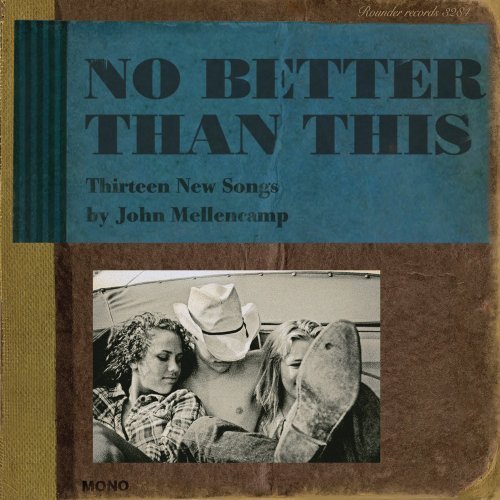
No Better Than This (2010)

1. Save Some Time to Dream
2. The West End
3. Right Behind Me
4. A Graceful Fall
5. No Better Than This
6. Thinking About You
7. Coming Down the Road
8. No One Cares About Me
9. Love at First Sight
10.Don't Forget About Me
11.Each Day of Sorrow
12.Easter Eve
13.Clumsy Ol' World
When an artist says they're going “back to their roots,” it usually just means stripping away a few effects and tossing in an acoustic guitar. Not so here. Mellencamp doesn’t just nod to the past—he dives headfirst into it. Recorded with a 1950s reel-to-reel tape machine and a single microphone, in historic locations like the same room where Robert Johnson recorded in 1936, No Better Than This is about as serious a throwback as you can get.
But this isn’t a covers album. All thirteen tracks are Mellencamp originals, written with such a deep respect for early Americana that it’s hard to believe they weren’t pulled from some long-lost field recordings. The sound is dusty, raw, and perfectly imperfect—something that would have felt right at home on a 78 rpm shellac disc from your grandparents' attic.
It helps that Mellencamp has one of those voices. Scratchy, weathered, and just rough enough to sell these characters and stories without ever sounding forced. This isn’t Mellencamp playing a role—this is Mellencamp at his most stripped down and sincere. The songs channel everything from country and blues to rockabilly and folk, but never feel like genre exercises. These are old sounds being told by an old soul, and it all feels incredibly natural.
Lyrically, the album leans into the sort of down-and-out characters he’s always gravitated toward—disillusioned drifters, small town loners, working-class ghosts—but this time, they feel even more timeless, as if they’ve been pulled from Depression-era photographs and given voices. There's no real political bent here (a rarity for Mellencamp), but the social commentary still lingers between the lines.
It’s not a short album, and a couple tracks near the end wear a little thin. Still, the commitment to the aesthetic—right down to the sepia-toned production and minimalistic packaging—makes this one of the most immersive records of his career. It’s not meant for radio, and it’s not meant for nostalgia—it’s a work of quiet reverence, done with absolute conviction.
By this point in his career, Mellencamp had nothing to prove. And maybe that’s exactly why this record works so well.
Go back to the main page
Go To The Next Review